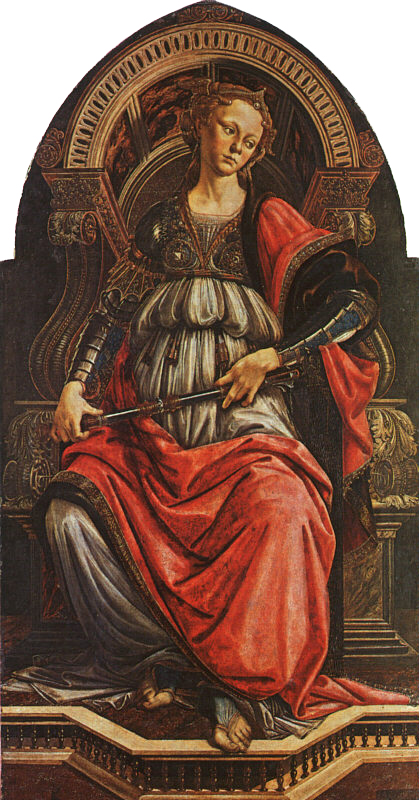He set His face to go to Jerusalem
Samaritan Villagers. Three Answers to Disciples.
(The Gospel History, Section 84)
And it came to pass, when the days were well-nigh come that he should be received up, he stedfastly set his face to go to Jerusalem, …
He set His face to go to Jerusalem
(The Saviour of the World, Vol VI Book I Poem IV)

Fortitude by Botticelli[1]
The days must pass ere, lessons o’er, he flies
To home and love and all upgathered joys,—
So Christ kept calendar, a secret score;—
None other knew He should be taken up,
And none perceived the anguish of the way,
The Dolorous Way, He trod; though all was writ
A thousand years before for men to read,—
How Christ should go as Lamb to slaughter led;
The smiting and the scorn, the Judgment Halls
Where He should stand accused nor open mouth,
Dumb as sheep led to slaughter; vile offence,
To read whereof, we beat our breasts and cry,
For we are men, and men have done this thing!
Those days were well-nigh come, and, knowing it,
Christ set His face towards Jerusalem!
O, Fortitude Divine, that, seeing all
As ’twere in mirror shewn,—each act of shame
Wrought on Him, every awful grief endured,—
He waited not their will, those murderous Jews,
But went to th’ Death whose poignancy He knew,
And all attendant shames; “It cannot be,”
Saith Christ, “that prophet perish out of thee,
Jerusalem, who hast the prophets slain!”
As one bound on a painful pilgrimage
Counts o’er the joys of home, seeks every room,
And handles this and that, the things he loved,
For remembrance, ere he goes, so did the Lord
Seek Galilee again to take fond leave
Of lake-side haunts, sweet dales, of humble roofs
Had sheltered the Son of Man?
St. Luke ix. 51.
[1] “Botticelli’s Fortitude is no match, it may be, for any that are coming. Worn, somewhat; and not a little weary, instead of standing ready for all comers, she is sitting,—apparently in reverie, her fingers playing restlessly and idly—nay, I think—even nervously, about the hilt of her sword.
For her battle is not to begin to-day; nor did it begin yesterday. Many a morn and eve have passed since it began; and now—is this to be the ending day of it? And if this—by what manner of end?
That is what Sandro’s Fortitude is thinking, and the playing fingers about the sword-hilt would fain let it fall, if it might be: and yet, how swiftly and gladly will they close on it, when the far-off trumpet blows, which she will hear through all her reverie!”
Mornings in Florence, John Ruskin.
Subscribe: Apple Podcasts | Google Podcasts | Spotify | Amazon Music | Stitcher | RSS